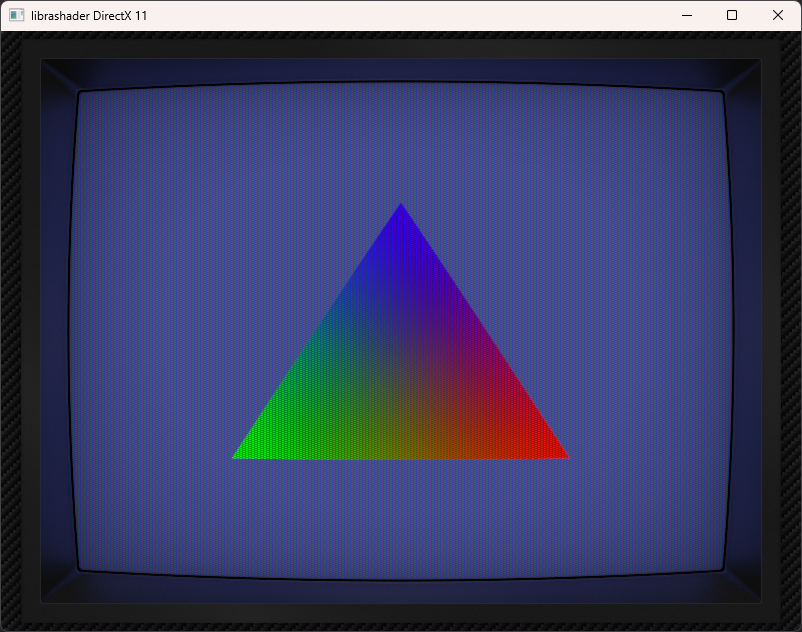

Mega Bezel SMOOTH-ADV on DirectX 11
librashader (/ˈli:brəʃeɪdɚ/) is a preprocessor, compiler, and runtime for RetroArch 'slang' shaders, rewritten in pure Rust.
librashader supports OpenGL 3, OpenGL 4.6, Vulkan, DirectX 11, and DirectX 12. Older versions of DirectX and OpenGL, as well as Metal, are not supported (but pull-requests are welcome).
| API | Status | librashader feature |
|-------------|------------|---------------------------|
| OpenGL 3.3+ | ✔ | gl |
| OpenGL 4.6 | ✔ | gl |
| Vulkan 1.3+ | ✔ | vk |
| Direct3D11 | ✔ | d3d11 |
| Direct3D12 | 🚧 | d3d12 |
| OpenGL 2 | ❌ | |
| DirectX 9 | ❌ | |
| Metal | ❌ | |
✔ = Render API is supported — 🚧 = Support is in progress — ❌ Render API is not supported
librashader provides both a Rust API under the librashader crate, and a C API. Both APIs are first-class and fully supported.
The C API is geared more towards integration with existing projects. The Rust librashader crate exposes more
of the internals if you wish to use parts of librashader piecemeal.
The librashader C API is best used by linking statically with librashader_ld, which implements a loader that dynamically
loads the librashader (librashader.so or librashader.dll) implementation in the search path.
For Rust projects, simply add the crate to your Cargo.toml
cargo add librashader
To build the C compatible dynamic library, cargo-post is required.
cargo post build --release --package librashader-capi
This will output a librashader.dll or librashader.so in the target folder.
The recommended way of integrating librashader is by the librashader_ld single header library, ABI stability
is important to ensure that updates to librashader do not break existing consumers.
Pre-1.0, nothing is guaranteed to be stable, but the following APIs are unlikely to change their ABI unless otherwise indicated.
libra_preset_*libra_error_*The following APIs, mostly runtime, are more likely to change their ABI before a 1.0 release as I experiment with what works best.
libra_gl_*libra_vk_*libra_d3d11_*libra_d3d12_*Linking against librashader.h directly is possible, but is not officially supported. You will need to ensure linkage
parameters are correct in order to successfully link with librashader.lib or librashader.a. The corrosion
CMake package is highly recommended.
The following Rust examples show how to use each librashader runtime. * Vulkan * OpenGL * Direct3D 11
Some basic examples on using the C API are also provided in the librashader-capi-tests directory.
librashader implements the entire RetroArch shader pipeline and is highly compatible with existing shaders, but there are some deliberate differences in design choices that may potentially cause incompatiblities with certain shaders.
Please report an issue if you run into a shader that works in RetroArch, but not under librashader.
glBlitFramebuffer rather than drawing a quad into an intermediate FBO.glTexParameter.ARB_spirv_extensions for loading shaders, and this will not be marked as a breaking change.ID3D11DeviceContext::CopySubresourceRegion rather than a CPU conversion + copy.VK_KHR_dynamic_rendering by default.
This extension must be enabled at device creation. Explicit render passes can be used by configuring filter chain options, but may have reduced performance
compared to dynamic rendering.Most, if not all shader presets should work fine on librashader. The runtime specific differences should not affect the output, and are more a heads-up for integrating librashader into your project.
Compatibility issues may arise with framebuffer copies for original history, but I have not found any yet;
if it does end up that this results in actual rendering differences I may change the implementation to be more in line
with RetroArch's copy implementation. However, since the Vulkan runtime already uses vkCmdCopyImage it is likely that it will
not cause issues.
If you wish to contribute a runtime implementation not already available, see the librashader-runtime crate for helpers and shared logic used across all librashader runtime implementations. Using these helpers and traits will ensure that your runtime has consistent behaviour for uniform and texture semantics bindings with the existing librashader runtimes.
These types should not be exposed in your publish API to the end user, and should be kept internal to the implementation of the runtime.
The core parts of librashader such as the preprocessor, the preset parser, the reflection library, and the runtimes, are all licensed under the Mozilla Public License version 2.0.
The librashader C API, i.e. its headers and definitions, not its implementation in librashader_capi,
are more permissively licensed, and may allow you to use librashader in your permissively
licensed or proprietary project.
To facilitate easier use of librashader in projects incompatible with MPL-2.0, librashader_ld
implements a loader which thunks its calls to any librashader.so or librashader.dll
library found in the load path. A non-MPL-2.0 compatible project may link against
librashader_ld to use the librashader runtime, provided that librashader.so or librashader.dll
are distributed under the restrictions of MPLv2.
Note that this means that if your project is not compatible with MPL-2.0, you can not distribute librashader.so or librashader.dll
alongside your project. The end user must obtain the implementation of librashader themselves.
At your discretion, you may instead choose to distribute librashader under the terms of GPLv3 rather than MPL-2.0